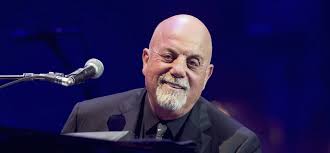
The lights were soft that night — gold and slow, like memory itself.
At seventy-five, Billy Joel sat behind his black Yamaha grand piano, the same one that had carried him through every heartbreak and every standing ovation. He had played “Vienna” thousands of times before — but never like this.
The intro rolled out as usual: that tender waltz between nostalgia and regret. Fans swayed, whispered the words. But halfway through the second verse, Billy’s hands stopped. His fingers hovered above the keys.
He looked down at the floor, then up at the ceiling, as if searching for a ghost.
“You know,” he said, his voice low, “people always ask me — who’s the girl in ‘Vienna’? They think it’s about a lover… or a city… or maybe even fame.”
He paused. The crowd waited. You could have heard a tear drop on the stage floor.
“Vienna isn’t a place,” he finally said. “It’s my mother.”
The Secret Hidden in a Song
He leaned back on the bench, smiling faintly.
“My mom used to tell me, ‘Don’t rush your life — let it meet you halfway.’ She said I was always trying to run before I knew where I was going.”
He tapped the piano gently — one note, like punctuation.
“When I wrote ‘Vienna’ in the ’70s, I thought I was writing about balance. But really, I was writing about her. I just didn’t realize it then.”
The audience sat frozen — thousands of faces lit by stage light, suddenly part of something unbearably intimate.
A Mother’s Echo
Billy told them how, years ago, he had visited his mother, Rosalind Nyman Joel, in Vienna after she had moved there in retirement. He described the city — its pace, its quiet, the old men feeding pigeons, the children playing violins in the street.
“I saw her sitting on a park bench, feeding birds,” he said. “And I thought, maybe this is what peace looks like — the thing she’d been trying to teach me all my life.”
That was when he wrote the line:
“Slow down, you crazy child, you’re so ambitious for a juvenile.”
The crowd erupted into soft applause — not for the performance, but for the revelation.
The Weight of Forty Years
Billy laughed, shaking his head.
“I kept that secret for forty years. I didn’t want to embarrass her. She was a private woman — didn’t want to be anyone’s muse.”
He reached into his pocket and pulled out something small — a folded note.
“But before she passed, she told me, ‘If you ever tell them, tell them I was right.’”
He looked down at the piano and whispered:
“You were right, Mom.”
The Song Begins Again
He turned back to the keys, took a deep breath, and began to play again — slower this time, each note heavier, every word carrying the gravity of goodbye.
When he reached the final line, his voice cracked.
“Vienna waits for you…”
He let the words hang there — suspended between the living and the lost — before closing his eyes. The band stayed silent. The lights dimmed to a single white beam over the piano.
Billy didn’t bow. He didn’t smile. He just sat there, both hands resting on the keys, whispering something the microphones barely caught:
“She’s still waiting.”
After the Show
Backstage, a stagehand asked if Billy wanted to include that story in the official recording. He shook his head.
“No,” he said. “That was for her.”
But by then, the moment had already spread online — shaky phone clips, fan posts, tearful comments. One viral caption read:
“He didn’t sing to the crowd tonight. He sang to his mother.”
And maybe that’s the quiet truth behind every great song —
that sometimes the person we’ve been singing to all along
was never a stranger, or a lover,
but the one who taught us how to listen.


